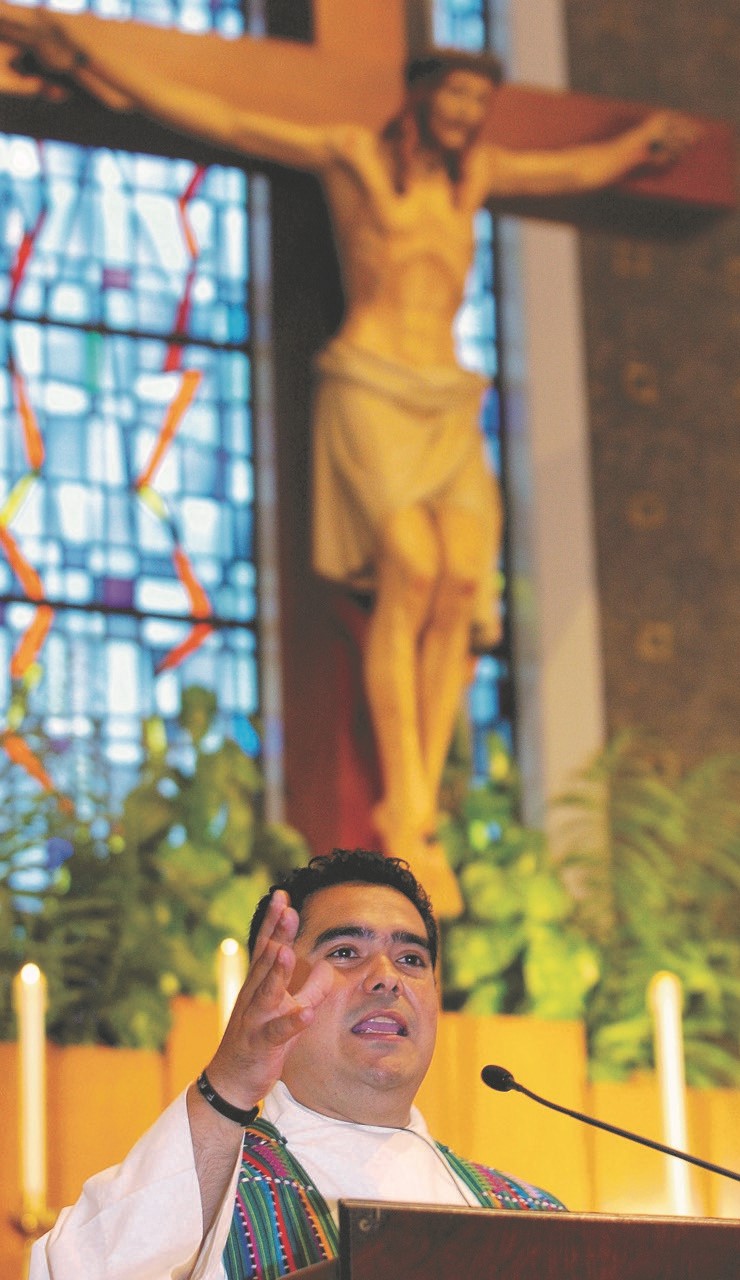
Fr. Norbert Sandoval. (File photo)
When Fr. Norbert Sandoval began serving in the Archdiocese of Milwaukee, his mom began forgetting things. Over time, these memory lapses became more frequent. As his mom was living in Venezuela, where he was from, his brother managed her care.
“The whole dynamic of the family changed, and I went through him to keep up with her stages of dementia,” Fr. Sandoval said. “I started looking for help, but in Venezuela, due to politics, there wasn’t much I could do.”
Additionally, Fr. Sandoval, who is an associate pastor at the Sheboygan North Catholic Parishes, including Holy Name of Jesus, St. Clement and St. Dominic, noticed others in his parishes were dealing with dementia issues in their families.
“Ethnic groups can be overlooked or uninformed of the many resources that are available to them when dealing with dementia,” said Fr. Sandoval. “Latinos have a higher likelihood of developing Alzheimer’s, and I am very passionate about helping to reach and support families who may be on this difficult journey.”
Dementia is the general word for a decline a person has in their mental ability that is severe enough to interfere with their everyday life, whereas Alzheimer’s disease is a brain disease that is a form of dementia. Detecting and diagnosing dementia early is important because it gives families time to prepare. This means that raising awareness and increasing access to screening is essential to giving Hispanic/Latino older adults and their families the information they need to make informed decisions about their future.
To help spread awareness about Alzheimer’s disease among Latinos, Fr. Sandoval selected the Alzheimer’s Association for Latino Outreach as his Lenten charity this year.
“It is important not to wait until the last minute when we can’t understand the behaviors and also to identify early and get treatment to determine if this is Alzheimer’s or some other form of dementia, rather than thinking a relative is just cuckoo or crazy,” Fr. Sandoval said. “In Latin America, there are not the kinds of services we have here for the family. We also have adult day care so people can take a family there. We need to spread the word about the signs of Alzheimer’s and how to treat it.”
According to Mary Pat Rick, marketing communications manager for the Alzheimer’s Association-Wisconsin Chapter, they create awareness through outreach programs.
“We have a dedicated person, Virginia Zerpa, who supports our Latino outreach efforts in Wisconsin. We have established strong partners in the Milwaukee community — the largest are the United Community Center and the 16th Street Community Health Center — to reach Latino families with our services,” Rick said. “Virginia offers free education and support groups (in Spanish) for families. She also attends to community resources that target Latinos throughout the year.”
During Lent, the Sheboygan North Catholic Parishes pick two charities to support, one that Fr. Sandoval chooses and one that pastor Fr. Mark Brandl chooses.
“We call it three parishes, two priests and two charities, and we have been picking different charities each year,” Fr. Sandoval said. “Last year we raised around $15,000, and we split it equally between the two charities. We hope to raise a similar amount this year.”
The parish is supportive of Fr. Sandoval’s efforts to shed light on Alzheimer’s and other dementia issues. A number of parishioners have thanked him for supporting this charity, as it will bring light on a struggle that affects everyone in the family.
“We have a high number of Hispanics — about 200-300 — come to our Sunday Spanish Mass at St. Clement,” Fr. Sandoval said. “We have a great need to bring awareness, and I will do all I can to bring programs that are helpful to my parishioners.”
Donations will be accepted at the Sheboygan North Catholic Parishes through April 6.
INFO BOX
Alzheimer’s Latino Statistics:
- Hispanics are 1.5 times more likely than white people to have dementia.
- Almost 6 in 10 (57 percent) believe that a significant loss of memory or cognitive abilities is a normal part of aging.
- Almost 9 out of 10 Hispanics (85 percent) say it is important for Alzheimer’s and dementia care providers to understand their ethnic or racial background and experiences.
To learn more about Alzheimer’s disease and other dementia, and find local support services and resources, visit alz.org/wi.
